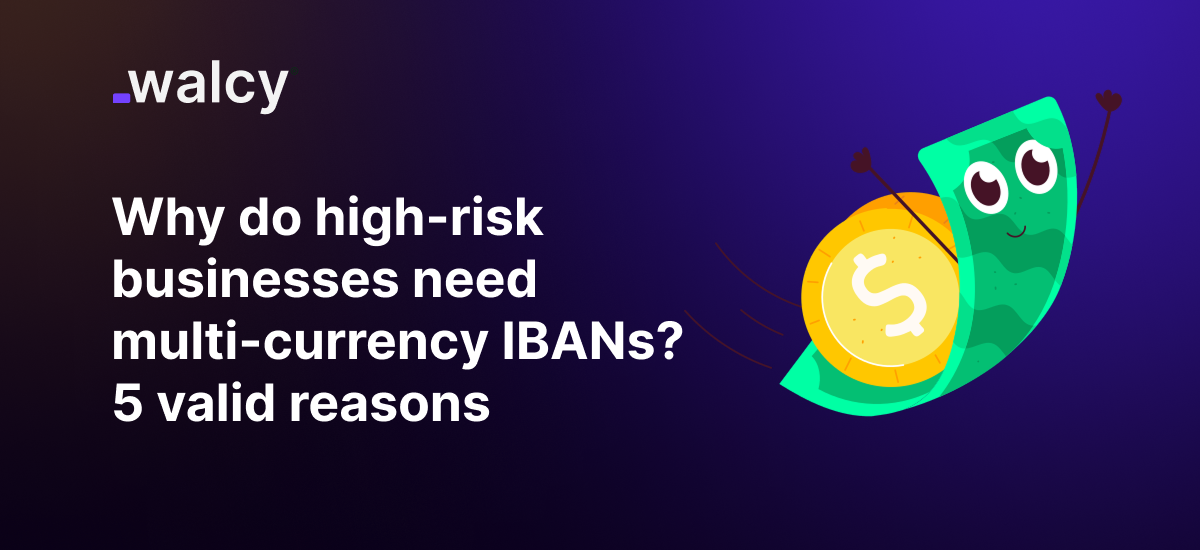Introduction to Multi-Currency IBANs
In today’s globalized economy, businesses are engaging in international transactions and commerce more than ever. Businesses involved in high-risk industries are faced with even more difficulties in operating their financial operations due to regulatory control, payment controls, and bank limitations. The use of multi-currency IBANs is one of the best solutions for such businesses.
Multi-currency IBAN allows businesses to hold, receive, and remit multiple currencies within a single account, thereby making cross-border transactions easy. High-risk businesses generally encounter banking restrictions on financial limits by traditional banking organizations, and thus multi-currency IBANs turn out to be a valuable asset for smooth international business banking.
Knowing High-Risk Business Banking
High-risk businesses are those businesses that operate in highly regulated sectors, volatile market conditions, or increased fraud risk. High-risk sectors are:
- Forex and Cryptocurrency Exchanges – Regulatory focus and volatility.
- Online Gambling and Gaming – Legal stringent regulation and excessive chargeback.
- Adult Entertainment and Escort Services – Reputation risk and payment restrictions.
- E-commerce and Dropshipping – Fraud risk and cross-border payments.
- Pharmaceuticals and Nutraceuticals – High refund rates and compliance problems.
- Airlines and Travel – Susceptible to financial problems and high refund rates.
- Offshore Banking and Financial Services – Regulating complexity and AML (Anti-Money Laundering) compliance.
These companies have severe difficulties accessing banking facilities since they pose different risk factors. Multi-currency IBANs give such companies an alternative channel via which they may enjoy having their financial operations handled effectively, and thereby execute their operations in different jurisdictions while remaining within IBAN directive compliance.
Why Multi-Currency IBANs Are Needed for High-Risk Companies
-
Cross-Border Payments Made Easier
High-risk companies tend to operate across many different countries, having international customers and suppliers. A multi-currency IBAN removes the requirement for numerous local bank accounts, making it easier for companies to:
- Receive and make payments in different currencies.
- Evade excessive conversion fees and poor exchange rates.
- Enhance transaction efficiency and speed.
For example, a global deposit-taking online casino may be able to have a multi-currency IBAN to receive payments in multiple currencies without the hassle of maintaining separate bank accounts.
-
Access to Multi-Currency Account
A multi-currency IBAN provides the advantage of managing funds in several currencies within a single banking system. This makes it convenient for businesses to:
- Streamline financial complexity management
- Avoid foreign exchange losses through keeping funds in several currencies.
- Improve cash flow management in international markets.
For example, a web-based forex trading site accepting USD, EUR, GBP, and JPY can use a multi-currency IBAN to accept different currency transactions without problems.
-
Offshore Business Banking and Financial Flexibility
High-risk businesses often utilize offshore banking as an avenue for escaping financial restrictions by local banks. Offshore banks and payment service institutions offer multi-currency IBANs that allow companies to:
- Enjoy financial secrecy and safety.
- Access international banking services beyond local limitations.
- Expand their business internationally without the limitations of banks.
To illustrate, a nutraceutical company under bank restriction in its home country is able to have an offshore multi-currency IBAN for smooth foreign trade.
-
High-Risk Merchant Account Integration
Traditional banks typically avoid providing merchant accounts to high-risk businesses due to high levels of chargebacks and regulatory challenges. A multi-currency IBAN allows businesses to connect with high-risk merchant account suppliers such that they can:
- Take payments in quick time in multiple currencies.
- Lower chargeback risks with improved payment processing solutions.
- Receive secure banking solutions tailored for high-risk businesses.
For example, a high-ticket online electronics company can apply its IBAN with a high-risk payment processor to facilitate continued processing of transactions.
-
Sophisticated Global Transaction Solutions
Multi-currency IBANs provide high-risk businesses sophisticated global transaction solutions, such as:
- SWIFT and SEPA payments for secure international transfers.
- Real-time currency conversion for streamlined transactions.
- Automated reconciliation for improved financial reporting.
This is particularly beneficial for travel agencies that have many suppliers, airlines, and customers across different geographies, requiring efficient global payment solutions.
-
IBAN Compliance and Risk Reduction
Regulatory compliance is one of the biggest problems faced by high-risk businesses. Multi-currency IBANs allow businesses to comply with international banking needs by:
- Completely adhering to AML (Anti-Money Laundering) and KYC (Know Your Customer) regulations.
- Supporting transparent and traceable financial transactions.
- Meeting regulatory requirements in different jurisdictions.
For example, a cryptocurrency exchange must meet stringent AML regulations. A regulated multi-currency IBAN allows the company to maintain proper documentation and reporting, which reduces the risk of bank restrictions.
Obstacles of Obtaining a Multi-Currency IBAN for High-Risk Businesses
Despite the benefits, obtaining a multi-currency IBAN is not straightforward for high-risk businesses because:
- Strict Banking Rules – Banks undergo stringent due diligence before issuing an IBAN to high-risk business entities.
- Higher Account Maintenance Charges – Solutions for high-risk business banking cost more.
- Limited Banking Choice – Fewer banks offer services to high-risk sectors, and it is difficult to find proper banking partners.
- Regulatory Hurdles – Varying compliance guidelines in various regions make banking more difficult.
How to Submit an Application for a Multi-Currency IBAN for High-Risk Business Banking
Acquiring a multi-currency IBAN is a crucial process for businesses dealing with high-risk enterprises. Due to the fact that international money movements are complicated, draw regulatory attention, and come with elements of risk analysis, businesses ought to follow a soundly conceived and strategic path towards increasing approval opportunities. Below is a step-by-step, comprehensive guide to obtaining a multi-currency IBAN for high-risk business banking.
1. Identify Appropriate Banking Partners
One of the biggest challenges for high-risk businesses is finding a bank willing to provide banking services. Due to stringent regulations, many traditional banks are not willing to bank with high-risk industries. Some banks and financial institutions, however, specialize in high-risk business banking and provide products like multi-currency IBANs.
Key Considerations When Choosing a Banking Partner:
- High-Risk Industry Experience – Seek banks with experience handling companies in high-risk industries like gaming, forex trading, crypto currency, adult entertainment, or CBD sales.
- Multi-Currency Support – Make sure the bank provides IBANs that support transactions in various currencies, enabling international trade and cross-border payments.
- International Reach and Network – Select a provider with good international banking connections and compliance regimes across various jurisdictions.
- Digital Banking Features – Select banks offering sophisticated digital banking platforms with seamless fund transfers, transaction tracking, and automated compliance solutions.
Where to Locate Suitable Banking Partners?
- Specialized offshore banks
- Electronic Money Institutions (EMIs)
- Fintech payment service providers
- High-risk business banking consultants
Through thorough research, businesses can locate institutions that fit their needs and offer a compliant multi-currency IBAN solution.
2. Prepare Required Documentation
High-risk businesses have to go through rigorous due diligence procedures, wherein they have to submit vast documentation to verify authenticity and financial stability. Incomplete or withheld documentation can lead to delays or outright rejection of the IBAN application.
Major Documents That Have to Be Submitted with a Multi-Currency IBAN Application:
- Registration Documents of Business – Certificate of Incorporation, Articles of Association, and Memorandum of Understanding.
- Business Operations Proof – Utility bills, lease agreements, or other records establishing a physical presence.
- Tax Identification Number (TIN) – To comply with local tax regulations.
- KYC (Know Your Customer) and AML (Anti-Money Laundering) Policies – Businesses must provide detailed compliance policies outlining customer verification procedures and risk management systems.
- Business Model and Revenue Streams – An open financial plan describing how the business operates, its revenue streams, and the expected volume of transactions.
- Bank Statements and Financial Reports – Past banking record, audited accounts, or projected revenue forecasts.
- Identity Verification of Business Owners and Directors – Passports, national identification documents, or other formal documents verifying the identities of all key stakeholders.
Additional Compliance Steps:
- Banks may request extra due diligence (EDD) for firms operating in high-risk fraud or financial crime sectors.
- Firms operating in multiple jurisdictions may be asked to provide extra compliance documents based on the laws of each country.
Preparing these documents in advance helps ensure a smooth application process with no delays.
3. Know Compliance Requirements
Multi-currency IBANs come under strong financial regulation, and compliance plays an important part in getting the nod. Familiarity with such regulation helps businesses in meeting international banking requirements and reducing extraneous roadblocks.
Areas of Compliance:
- Compliance Regulation of IBAN – IBAN has compliance rules applicable across different locations. Businesses should learn regulations according to industry and geographical area.
- AML and Counter-Terrorist Financing (CTF) Legislation – Financial institutions have to abide by AML and CTF legislation to avoid criminal transactions. High-risk companies require strong policies for compliance.
- FATF (Financial Action Task Force) Guidelines – Businesses are required to comply with FATF guidelines on transparency and financial safety.
- GDPR (General Data Protection Regulation) and Data Privacy Legislation – If working in Europe, companies need to obey GDPR in order to secure financial data handling.
- Sanctions and Restrictions – Certain businesses and companies working in sanctioned nations could experience extra scrutiny or limitation if they request a multi-currency IBAN.
By proactively addressing compliance matters and ensuring they are in full compliance with financial regulations, businesses can demonstrate that they are responsible banks and improve their chances of approval.
4. Consult a Payment Solutions Provider
Because of the complexity of high-risk business banking, consulting a specialized financial services firm can make the IBAN application process easier. Payment solution provider’s offer tailored banking solutions specifically designed to address the particular needs of businesses with regulatory concerns.
Why Use a Payment Solutions Provider?
- Access to Multiple Banking Institutions – They already enjoy established relationships with banks and financial institutions willing to serve high-risk enterprises.
- Assistance in Documentation and Compliance – Experts help in the preparation of documents, ensuring fulfillment of banking compliance requirements.
- Fast Approval and Processing – Working with a veteran provider can speed up the IBAN approval process.
- Continuing Support and Risk Management – Payment providers offer fraud detection features, chargeback protection tactics, and transaction monitoring.
How to Choose the Best Payment Solutions Provider?
- Look for providers with high-risk industry experience.
- Check for regulatory compliance and licensing.
- Check customer reviews and testimonials for reliability and service quality.
- Check the range of financial products offered, including multi-currency IBANs, virtual accounts, and global payment solutions.
Conclusion
Multi-currency IBANs are a savior for companies operating in high-risk industries, offering major financial solutions such as easy cross-border transactions, management of multiple currencies, offshore banking advantages, and compatibility with high-risk merchant accounts. Though obtaining a multi-currency IBAN is not straightforward, companies clearing the regulatory threshold and partnering with committed financial institutions can attain an international opportunity through international business banking. By virtue of a multi-currency IBAN, risky businesses can ensure long-term fiscal stability and global expansion.



